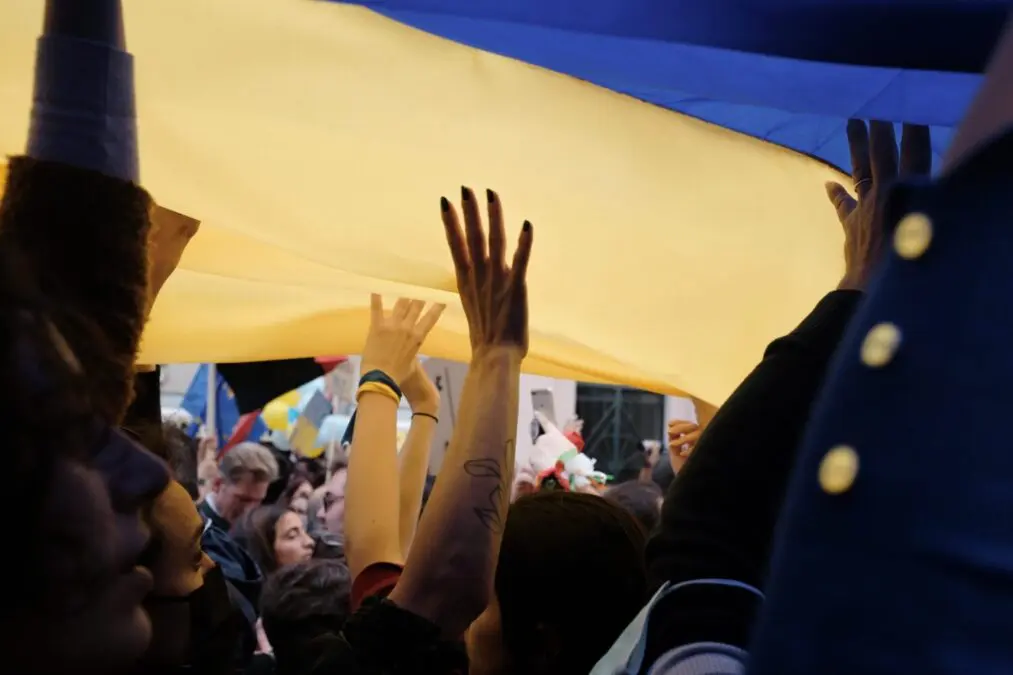Throughout the development of the Russian invasion of Ukraine, the communities inside and outside the country transform. They attempt to survive this crisis through unity. But, there were already wounds in Ukrainian society before the war. The person interviewed for this article prefers to maintain anonymity.
The war is lasting much longer than expected; long enough to show its impact on Ukrainian and Russian societies. As a result, the world dramatically changed for the people of Ukraine and Russia in a matter of weeks. Ukrainians now face a homeland damaged by the war. They face a refugee crisis. And at the same time, the country reaffirms its existence against the invaders. Concurrently, the Russians are now facing a country in a desperate financial situation. Russia is now an international pariah.
“The hate sentiment towards Russians is growing stronger and stronger with each day of the war. This is so, especially after Bucha, Mariupol, and lately Kramatorsk.”, says a Ukrainian immigrant living in Portugal.
He explains that “in the beginning, there was the sentiment that it was not the fault of the Russian people, that they were victims of Putin’s regime too,” said my source. “But as time went by, and as we continue to see in the opinion polls regarding the war, the lack of protest, and the complete disregard for all the crimes Russia is committing…” Ukrainians are now just “angry” and “sad”, and Russians are increasingly using “racial slurs towards Ukrainians.”
There is a tone of frustration, as the Ukrainian citizen says, that there are “Russians putting Z-symbols on their cars, and calling the police over “treason” because their neighbour put up a Ukrainian flag on the window, instead of blaming the government and Putin for starting the war”.
This ongoing and everyday hotter debate about the division between pro-Russia and pro-Ukraine reminds him that “following the annexation of Crimea, there were many people who interpreted the war differently. The people who got their news from Russian sources in 2014, clearly, don’t support Ukraine and believe Russia’s propaganda. It’s a minority, but those people still exist.”
He says that those people want Ukraine to surrender and a Russian victory, as they are promised an “economic miracle” by the propaganda.
The tension between pro-Ukraine Ukrainians and pro-Russia Ukrainians is reportedly increasing. “If it’s inside families, then there are arguments and extremely heated debates. But, outside this circle, the pro-Russia Ukrainians must conceal their views.”
About the pro-Ukraine Ukrainian community, he mentions that Ukrainian emigrants: “have a feeling that they can’t do anything”. That they try to help mainly through volunteer centres that ship basic necessities to Ukraine. And he doesn’t forget those who go fight in Ukraine or send money to the army. Yet, there are many who “do nothing” because “they don’t have the time” or money.
Responding to the question, “Do you believe that a Ukrainian victory is possible?” He said that people are now more motivated to fight than ever, as the initial shock is over, and so he believes that a “Ukrainian victory is highly possible.”
“People in Kherson, despite the occupation by Russia and repression by soldiers, still protest every Sunday.”
He states that there is a “growing sense of national pride and healthy patriotism” and a “renaissance of Ukrainian culture, language, and art.” “Many Youtubers are now speaking Ukrainian instead of Russian”, and “even I switched my phone language to Ukrainian.”
For now, he only fears the possibility that “despite popular discontent, Russia could order general mobilization, and simply flood Ukraine with soldiers.”. This would most likely expand the conflict as a consequence. This may be very improbable, he says. “Because one thing is to say that you support the war, because Soloviev [a popular Russian TV host] says so on TV, and it is something else having to go yourself or sending your son and husband to the war.” said my source.
Regarding the treatment of Ukrainian emigrants receive since the war, he points out that “people are quite nice.” “They ask me about my family and my overall well-being. It makes me feel quite better when I go around the city and see Ukrainian flags all over the buildings.”
He also states that in Portugal, the war has united the Ukrainian community. “People in Facebook groups have been helping the refugees and each other.” They now feel like they “are not alone and that the world is on our side”.







